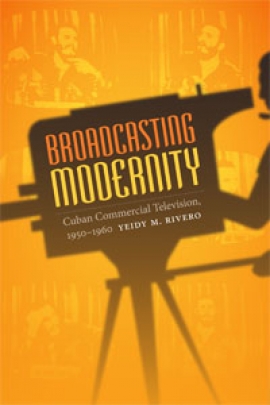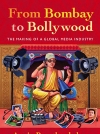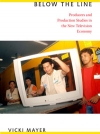
Yeidy Rivero’s Broadcasting Modernity investigates diverse strands of identity, culture, politics, law, and technical capacity that contributed to the rise of Cuban television broadcasting: from a commercial, largely US-modeled and Euro-American inspired purveyor of Cuban modernity to its revolutionary and immediate post-revolutionary enunciation of a state-managed socialist vision of the Cuban modern. The book fills a gap in contemporary scholarly investigations of Latin American and U.S. Spanish-language television industries by digging into the archives in both the US and Cuba, not least so as to circumvent ideological divides that still color the testimony of actors from the period who now reside both north and south of the Florida Straights. The book achieves a well-documented picture of commercial broadcast television as a site of Cuban national identity formation during its founding decade 1950 to 1960.
Rivero describes the book’s title as referring to “the technological, legal, business, production, cultural, geographic, and narrative efforts to employ television as a stage to represent Cuba as a developed nation.” Concerned as it is with forces shaping the conceptualization and representations of Cuba’s modern self-identity in the medium’s tumultuous first decade, Broadcasting Modernity frames its analysis around four “spectacles of modernity”: spectacles of progress, of decency, of democracy, and of revolution. The approach enables a demonstration of both continuity and change in the socio-political ethos of Cuban national television. In this passage the pedagogical function of Bautista-era broadcasting is disclosed in terms of a “spectacle of decency”; here sex, race, gender, age, and class stereotypes derived from elites' visions of a civilized, Europeanized high culture negate, and largely erase from view, the full diversity of vernacular Cuban social life during the increasingly repressive years leading up to the revolution.
Rivero interrogates the central issues of what Cubanness is during this period and who it serves, questions that go to the heart of the constructions and exclusions that generate a ‘modern’ mainstream national ethnic cultural identity. It shows television taking on increased responsibility for representing state ideals in relation to evolving political realities. Cuban commercial TV emerges less as a narrowly defined, US-inspired capitalist commercial enterprise than as a stage on which US, European, Latin, and revolutionary versions of modernity were represented and debated. Broadcasting Modernity is a rich case study on television and popular culture in a transitional society, and contributes to broader discussions of transnational trends involving broadcast media’s role in negotiating identity during unstable and globalizing periods.






